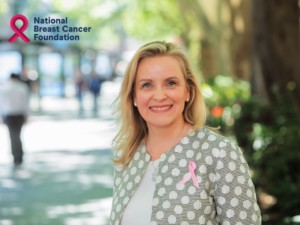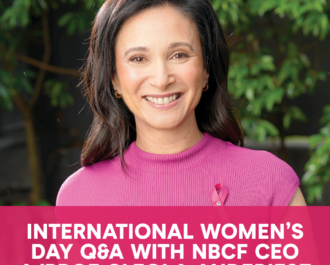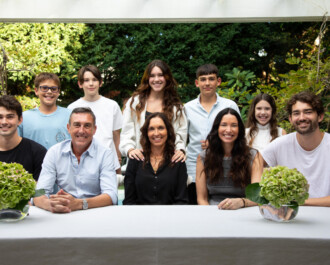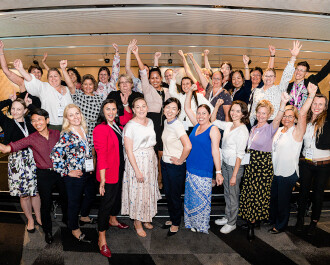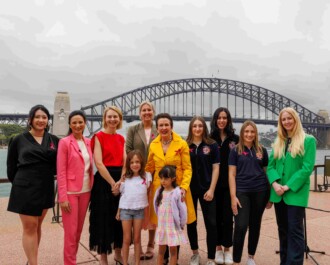
To coincide with the first day of National Breast Cancer Awareness Month, the National Breast Cancer Foundation (NBCF) has released new data showing 30,000 more lives could be lost to breast cancer by 2030*, without adequate research investment.
NBCF has funded vital life-saving research into breast cancer since 1994, and the data shows that with this funding from the generous Australian community, over 44,000 lives have been saved in this time*. This has been achieved through identifying new risk factors, improving early detection and creating more effective, less harsh treatment options.
The data also shows:
• A woman’s risk of breast cancer is now 1 in 7, up from 1 in 8 in the last year alone**
• 8 women would continue to die every day which is the 2nd highest cancer killer in Australian women**
• Over 76,000 Australians would also lose a direct family member – a mother, sister, or daughter by 2030***
• Australia would stand to lose over $1.868 billion in wages just through lives lost to breast cancer, this year alone
“This year alone nearly 20,000 Australians, both men and women, will come face to face with the disease and unfortunately more than 3,000 will lose their life. This doesn’t have to be the case though; the National Breast Cancer Foundation has launched an ambitious target of Zero Deaths from breast cancer, but it is up to everyday Australians to help us achieve it,” she said.
“Our target is possible but only if we continue to receive direct investment for the world-class research we fund. We are at a critical juncture whereby a future where no Australian has to lose a parent, partner, sibling or child to this devastating disease is in sight. By investing in NBCF’s vision of zero deaths from breast cancer, they can support our game-changing research projects and help us achieve the target,” she added.
Breast cancer is the most commonly diagnosed cancer in Australia.** Its incidence is rapidly rising, with breast cancer diagnosis rates almost doubling since 1994. 1 in 7 women will be diagnosed with breast cancer in their lifetime, and 53 Australians are diagnosed with the disease each day.** On average it costs Australia over $800 million per year in medical expenses to manage it.*****
This October, which is Breast Cancer Awareness Month, the National Breast Cancer Foundation is putting a spotlight on how the Australian community can save the 8 women who die from the disease each and every day, so that no-one has to have a world without a loved one dying from breast cancer.
NBCF will continue to invest in cutting-edge research projects to achieve Zero Deaths from breast cancer. We will do this by analysing large datasets across the country to identify trends and factors contributing to lower survival. We will also be funding a significant amount of research into the most aggressive breast cancer subtypes so that we can improve detection and treatment, particularly in metastatic and triple-negative breast cancers. In addition, we will conduct research to enable better health service delivery and services across Australia so that breast cancer survival is something accessible to all.
Dr Rohan Bythell-Douglas is just one of the researchers who has been funded through NBCF’s research grants this year, leading a project to bring a breakthrough imaging technique to Australia for the first time to learn more about the FANCM gene. This new gene has only recently been identified as a risk factor for inherited breast cancer and Dr Bythell-Douglas and his team will use this information to investigate why the FANCM gene mutations predispose women to breast cancer. This project will likely lead to the introduction of FANCM genetic testing in clinics, boosting the quality of information 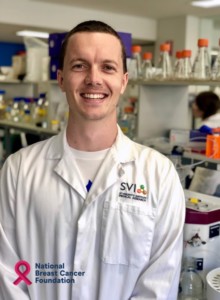 for women who may have this genetic risk. In addition, the findings may help to direct future treatment options for women with inherited breast cancer.
for women who may have this genetic risk. In addition, the findings may help to direct future treatment options for women with inherited breast cancer.
“A world without breast cancer deaths can only happen with the right research investment facilitated by the continued support of the Australian community,” he said.
To show your support for NBCF, there are a number of ways you can get involved:
- Donate today to fund game-changing breast cancer research
- Buy a special-edition pink product from one of the top brands that has teamed up with NBCF, including Estee Lauder, Black Chicken and Mestige Jewellery
- Host a Pink Ribbon Breakfast
- Raise money through a community fundraiser event
References:
*Based on data from: AIHW 2017. Cancer in Australia 2017. Supplementary data tables (2016 to 2018 mortality estimates)
** Breast cancer in Australia statistics | Breast cancer. (2018). Retrieved 25 September 2019, from https://breastcancer.canceraustralia.gov.au/statistics
*** Based on data from: ABS Australian Demographic Statistics, Estimated resident population, published 19.09.19
****AIHW, Cancer in Australia Report published March 2019, retrieved from: https://www.aihw.gov.au/reports/cancer/cancer-in-australia-2019/contents/summary on 29 September 2019
*****Goldsbury et al., 2018, PLOS ONE, Health services costs for cancer care in Australia: Estimates from the 45 and Up
Study published July 2018.
More News Articles
View all News
